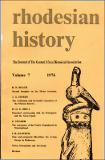| dc.contributor.author | Hancock, I.R. | |
| dc.coverage.spatial | Zimbabwe | en |
| dc.date.accessioned | 2015-12-18T11:43:52Z | |
| dc.date.available | 2015-12-18T11:43:52Z | |
| dc.date.issued | 1976 | |
| dc.identifier.citation | Hancock, I.R. (1976) Sane and pragmatic liberalism: the Action Group in Bulawayo 1955- 1965, Rhodesian History, vol. 7, pp. 65-85. Salisbury: Central Africa Historical Association. | en |
| dc.identifier.uri | https://opendocs.ids.ac.uk/opendocs/handle/20.500.12413/7247 | |
| dc.description | A journal article on one of the most prominent political civic groups in the then Southern Rhodesia (now Zimbabwe) | en |
| dc.description.abstract | On 1 august 1972 six Europeans met in a private house in Bulawayo and resolved to disband their society, hand over the assets of Rh$197 to charity and deposit the surviving records in the National Archives. In this way the Action Group, formed thirty years before, was quietly dissolved, its disappearance hardly noticed by the majority of the nominal membership. A fall in interest had been apparent for about eight years and the Group had only lingered on because a few members had hoped for revival of those headier days when they held regular and vigorous discussions and exercised a degree of political influence. This was the period, from the mid-1940s to the late 1950s, when the Group virtually controlled the Matabeleland branches of the federal and territorial governing parties, when ministers made special trips to Bulawayo to attend Group meetings, and government proposals were presented to the Group in order to have them tested in well informed and intellectually rigorous discussion. Most of the members were then in their thirties and forties, their careers were in business or the professions, they were deeply attached to Bulawayo, critical and perhaps envious of Salisbury, and confident that their own brand of sane and pragmatic liberalism represented the best hope for economic development and political stability. By the early 1960s, however, as the membership was getting older the Group was becoming irrelevant. Already divided and weakened by a split within the territorial governing party in 1958, the Group was powerless to prevent the collapse of the Federation which it had so ardently supported or the advent of extremist politics which it so little understood. All attempts to find a new role failed and it was sentiment alone, a quality not so evident in the younger active days, which kept the Group going until a handful of members called a halt in 1972. | en |
| dc.language.iso | en | en |
| dc.publisher | Central Africa Historical Association, Department of History, University of Rhodesia. | en |
| dc.rights.uri | http://creativecommons.org/licenses/by-nc-nd/3.0/ | en |
| dc.subject | Politics and Power | en |
| dc.title | Sane and pragmatic liberalism: the Action Group in Bulawayo, 1955- 1965 | en |
| dc.type | Article | en |
| dc.rights.holder | University of Zimbabwe (UZ) (formerly University College of Rhodesia) | en |


